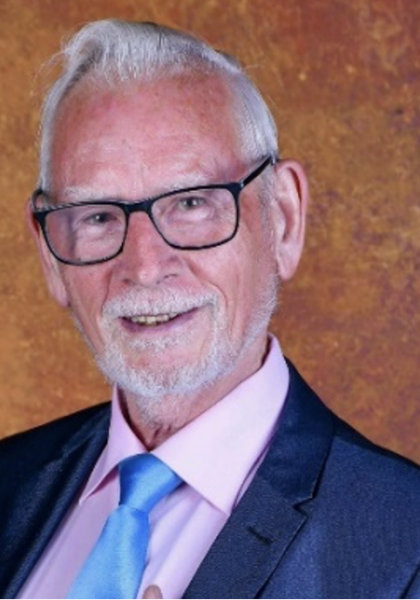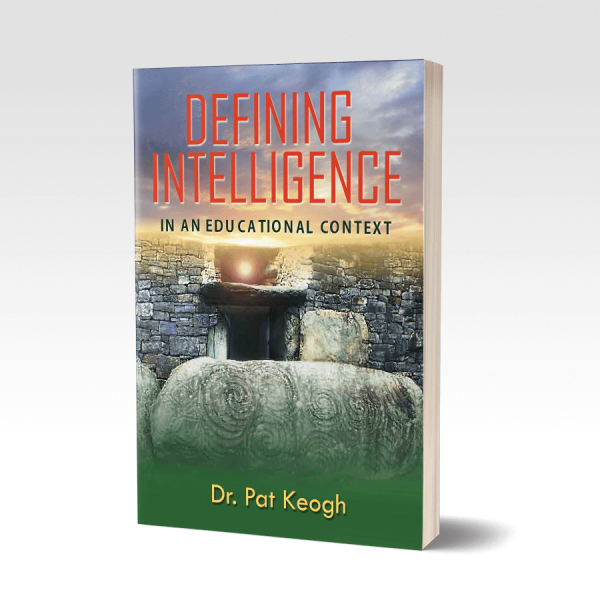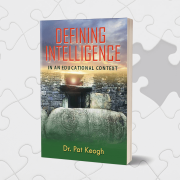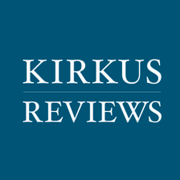DEFINING INTELLIGENCE
Defining Intelligence Video It may be unethical for a person to conduct an intelligence assessment on…



Pat Keogh is a retired Principal Teacher from Solas Chriost NS. He is a staunch advocate of child-centered education. He has had numerous articles published in the Irish Primary Teacher’s journal, In Touch, The Irish Timesnewspaper and in Leadership, an Irish Primary Principal’s magazine.
Pat has a master’s degree in philosophy and a doctorate in education. His doctoral thesis is entitled, “Thinking Critically.” He is keenly interested in the incredible calculating ability of the human brain and the illusiveness and ingenuity of the mind. He believes that the creative mind operates best when the body is at rest.
I met up with Dr Pat Keogh recently. He was Principal Tteacher of Solas Chriost Primary National School for 25 years, now retired. I had two questions for him:
What was the most rewarding part of his work as Principal teacher?
&
What was the most difficult or frustrating aspect of his job?
“The most rewarding aspect beyond all else”, he replied, “was helping children to learn and think for themselves, particularly, the shy and vulnerable child and the child encountering difficulties with learning and schooling. Children need to be given the language, the vocabulary but most of all the ability and skills to think critically and independently. They need self-esteem and courage to articulate their views in their own defence and in the defence of others. Too many people are led or misled by others. They are bombarded with marketing enticements, and with media presentations that may be biased and unsubstantiated or used out of context.
It is most rewarding to see a child overcoming a problem. I found that the overwhelming majority of teachers are very kind, compassionate and caring people. They make every effort to understand each child. I found that the quiet, unassuming, bashful teacher is often the best teacher. Teachers act in loco parentis. They get to know a child in a holistic way, in all dimensions; their social, psychological, physical and emotional abilities and failings. They see the child in the social context in how s/he interacts with other children and with adults. Outside agencies, working with children, will not get the in-depth knowledge and insight into a child’s thinking that a teacher gets; from the literacy & numeracy aspect to the child’s engagement in art, physical education and play time.
I enjoyed the challenge and opportunity to work with teachers in helping to understand and assist a child encountering a problem. We will not meet a problem child. But, we will encounter a child with problems. Children will never cease to amaze. They will brighten the day in the midst of work overload. The system will pressurise and test the resolve of any Principal. The child will uplift.
On one occasion, in my role as Principal, I was addressing infants at an assembly, giving some instructions on how they should behave in the playground — remember always be kind and gentle to other children — no bullying, no name calling, no fighting, no pushing in the line. Then, out of the moment’s silence that followed one child shouts out– and no giving the fingers like this, as he held up a closed fist with an extended middle finger. Of course I did agree with that child but I could not demonstrate it as he did. And as I was leaving the classroom another little child raised her hand to speak. I asked ‘can I help you’ or have you something you want to tell us; No! She said, but will you come to my birthday party on Saturday? You cannot refuse and you cannot accept. All I could say was; well isn’t that lovely you are very kind to invite me, but I might be too old and too big. “No! You ‘ll be all right”, she said, my granny and granddad will be there too.
I found the Management Authorities, the Parents’ Association, the Community Guards, The Irish National Teachers Organisation, the Irish Primary Principals’ Network, and the Department of Education’s inspectors to be always most helpful and supportive.
The second question concerning the most difficult and frustrating aspect was dealing with the rigidity and bureaucracy of the Health Service Executive. I had the privilege of working with caring, capable, dedicated, friendly, efficient speech and language therapists, some of whom came from Australia, USA, England and from various parts of Ireland including Dublin. But their employers developed a culture of long, drawn-out meetings, often lasting up to three hours, teasing out minutiae in some aspect of the criteria established for a child’s admission to our Speech and Language Impairment Classes. That was frustrating. The culture of waiting seemed to be endemic in the Health System; waiting for an appointment date for some ailment, then a number of people are given an appointment for the same date and time, you sit and wait in a waiting room.
Long discussions often took place on whether a child meets criteria, even when there is no other child awaiting placement in the class and that child meets 95% or more of the criteria. When the criteria became more important than the child, I felt uncomfortable. I believe in child-centred education.
It was frustrating when criteria were used to exclude a child from a service more than to include him/her. Rules, regulations, and criteria should be there to benefit a child. Of course, fair, and just application of rules and criteria must be applied but ensure that the child is at the centre and not just an object to meet criteria. Treat, and Teach the child to think independently, not merely to fit into the system.
However, working with teachers, speech and language therapists, child carers, school ancillary staff, parents and particularly with children was most rewarding and far outweighed any difficulties or frustrations encountered.
There is no other job or profession that will give you the same satisfaction and rewards as when you see a child overcome difficulties, achieving, and succeeding, as the teaching profession does.
I was privileged to have been in that profession as a Classroom Teacher for 20 years and Principal Teacher for 25 years.
Con Coulton (interviewer)
Tallaght Express
It may be unethical for a person to conduct an intelligence assessment on another human being. Human intelligence is unquantifiable. Observing or analyzing behavior, appearance, personality, beliefs, or acquired knowledge cannot produce a quantifiable measure of a person’s intelligence. The brain can perform millions of billions of calculations per second. This gives the person enormous power and incalculable potential. We are thinking beings. We are compelled and condemned to think. Thinking is process. We cannot analyze thinking, but we can analyze thoughts and ideas, the products of thinking. The mind can reflect on the past, live in the present, and plan for the future. Intelligence involves abstract, purposeful, logical thinking, and the ability to create and execute ideas. It also includes unconscious thinking. Primary education should allow time in the curriculum for students to daydream purposefully. In early schooling, greater emphasis should be placed on creativity, music composition, innovation, and artistic pursuits.

Defining Intelligence Video It may be unethical for a person to conduct an intelligence assessment on…
For one person to attempt to measure another’s intelligence may be unethical. One human being’s having…
1) Dr. Keogh, first of all, do you think it appropriate to try to measure one’s…
It may be unethical for a person to conduct an intelligence assessment on another human being.…

“Beautiful writing on mind, brain and intelligence. Dr. Keogh goes on to stress the importance of day-dreaming.”

“The chapter on personality is most informative and gives us a real insight into how we act and behave and why we act and behave as we do.”

“As a teacher involved in mainstream teaching I found the section on Activity methods of teaching most interesting and informative.”

“He also includes a useful glossary of terms to orient readers. Despite the heavy subject matter, Keogh write in a clear manner and employs accessible metaphors!”